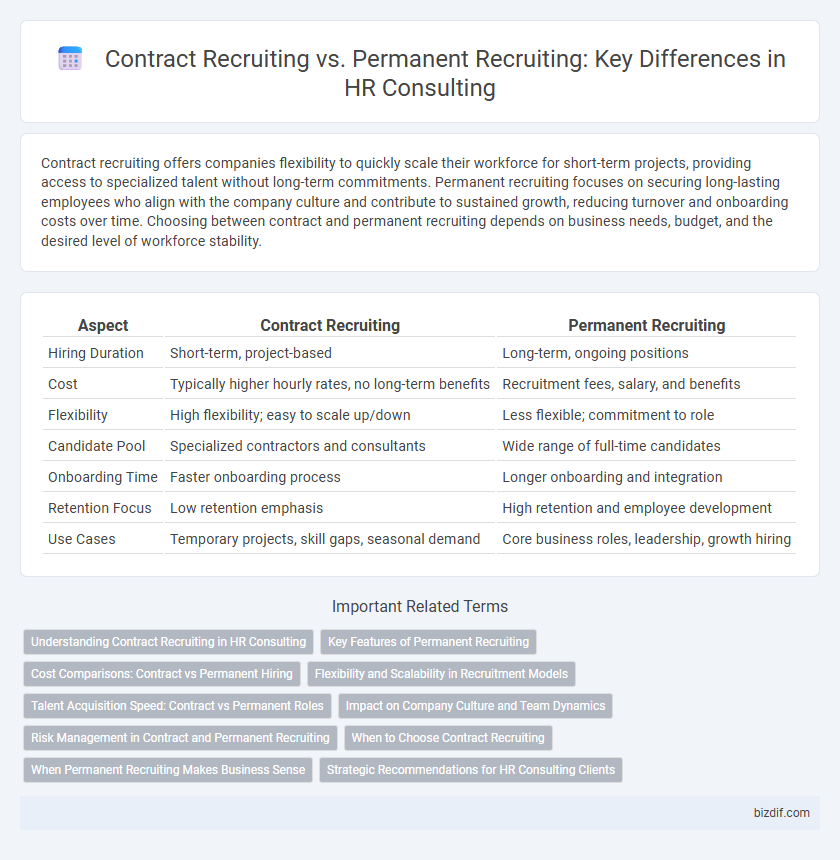Contract recruiting offers companies flexibility to quickly scale their workforce for short-term projects, providing access to specialized talent without long-term commitments. Permanent recruiting focuses on securing long-lasting employees who align with the company culture and contribute to sustained growth, reducing turnover and onboarding costs over time. Choosing between contract and permanent recruiting depends on business needs, budget, and the desired level of workforce stability.
Table of Comparison
| Aspect | Contract Recruiting | Permanent Recruiting |
|---|---|---|
| Hiring Duration | Short-term, project-based | Long-term, ongoing positions |
| Cost | Typically higher hourly rates, no long-term benefits | Recruitment fees, salary, and benefits |
| Flexibility | High flexibility; easy to scale up/down | Less flexible; commitment to role |
| Candidate Pool | Specialized contractors and consultants | Wide range of full-time candidates |
| Onboarding Time | Faster onboarding process | Longer onboarding and integration |
| Retention Focus | Low retention emphasis | High retention and employee development |
| Use Cases | Temporary projects, skill gaps, seasonal demand | Core business roles, leadership, growth hiring |
Understanding Contract Recruiting in HR Consulting
Contract recruiting in HR consulting involves sourcing candidates for temporary, project-based roles tailored to specific client needs, enabling flexibility and cost-efficiency. This approach prioritizes short-term talent acquisition, often requiring specialized skills for a defined period, which supports businesses during peak workloads or transitional phases. Contract recruiting reduces long-term employment commitments, allowing companies to adapt swiftly to market changes while maintaining access to expert professionals.
Key Features of Permanent Recruiting
Permanent recruiting emphasizes long-term talent acquisition aimed at building a stable workforce, prioritizing cultural fit and career development potential. This approach involves comprehensive candidate assessments, thorough background checks, and onboarding processes tailored to ensure retention and employee engagement. Investment in permanent recruitment fosters organizational growth through sustained employee contributions and reduced turnover rates.
Cost Comparisons: Contract vs Permanent Hiring
Contract recruiting typically incurs higher hourly rates but reduces long-term financial commitments such as benefits, taxes, and severance costs associated with permanent hiring. Permanent recruiting involves upfront expenses including recruitment fees, onboarding, and comprehensive benefits packages, leading to higher total cost of employment over time. Organizations must analyze the balance between immediate project needs and sustained workforce investment to optimize hiring expenses effectively.
Flexibility and Scalability in Recruitment Models
Contract recruiting offers unparalleled flexibility and scalability, allowing businesses to quickly adjust workforce size based on project demands and budget constraints. Permanent recruiting focuses on long-term talent acquisition, ensuring organizational stability and cultural fit but with less adaptability to fluctuating workload. Leveraging a hybrid approach can optimize recruitment outcomes by balancing immediate resource needs with sustained team growth.
Talent Acquisition Speed: Contract vs Permanent Roles
Contract recruiting accelerates talent acquisition by focusing on filling roles quickly with candidates who possess immediate availability and specified skill sets, reducing time-to-hire significantly compared to permanent recruiting. Permanent recruiting involves a more extensive vetting process including cultural fit assessments and longer onboarding, which extends the overall hiring timeline. Organizations prioritizing rapid workforce scaling or project-based demands benefit from contract recruiting's speed, while permanent recruiting suits long-term strategic talent growth.
Impact on Company Culture and Team Dynamics
Contract recruiting injects short-term talent tailored for specific projects, which can foster flexibility but may disrupt company culture due to limited integration and transient team dynamics. Permanent recruiting builds cohesive teams aligned with long-term values and business goals, strengthening a consistent culture and promoting collaboration. Balancing both approaches requires strategic HR consulting to align hiring practices with organizational culture and enhance overall team performance.
Risk Management in Contract and Permanent Recruiting
Contract recruiting reduces long-term liability by limiting employment duration, thus minimizing risks related to layoffs and severance costs. Permanent recruiting involves higher risk exposure due to commitments like benefits, legal compliance, and potential wrongful termination claims. Effective risk management in HR consulting requires balancing workforce flexibility with legal and financial responsibilities in both contract and permanent hiring strategies.
When to Choose Contract Recruiting
Contract recruiting is ideal for businesses facing short-term projects, seasonal spikes, or specialized skill gaps that require immediate filling without long-term commitment. It provides flexibility to scale the workforce quickly while controlling costs and mitigating risks associated with permanent hires. Organizations experiencing rapid growth or uncertain market conditions often benefit from leveraging contract recruiting to maintain agility and operational efficiency.
When Permanent Recruiting Makes Business Sense
Permanent recruiting makes business sense when organizations aim to build long-term institutional knowledge and foster employee loyalty, reducing turnover costs over time. Hiring permanent staff is ideal for roles critical to a company's core operations that require deep organizational understanding and cultural alignment. Companies experiencing steady growth or needing to sustain competitive advantage benefit from investing in permanent talent for continuity and stability.
Strategic Recommendations for HR Consulting Clients
HR consulting clients benefit from leveraging contract recruiting for projects demanding specialized skills or flexibility, while permanent recruiting optimizes long-term organizational growth and culture fit. Strategic recommendations emphasize aligning talent acquisition approaches with business goals, advising a hybrid model that balances immediate operational needs and sustainable workforce development. Data-driven hiring analytics and market trend insights empower clients to refine recruitment strategies, ensuring optimal resource allocation and talent retention.
Contract recruiting vs permanent recruiting Infographic

 bizdif.com
bizdif.com